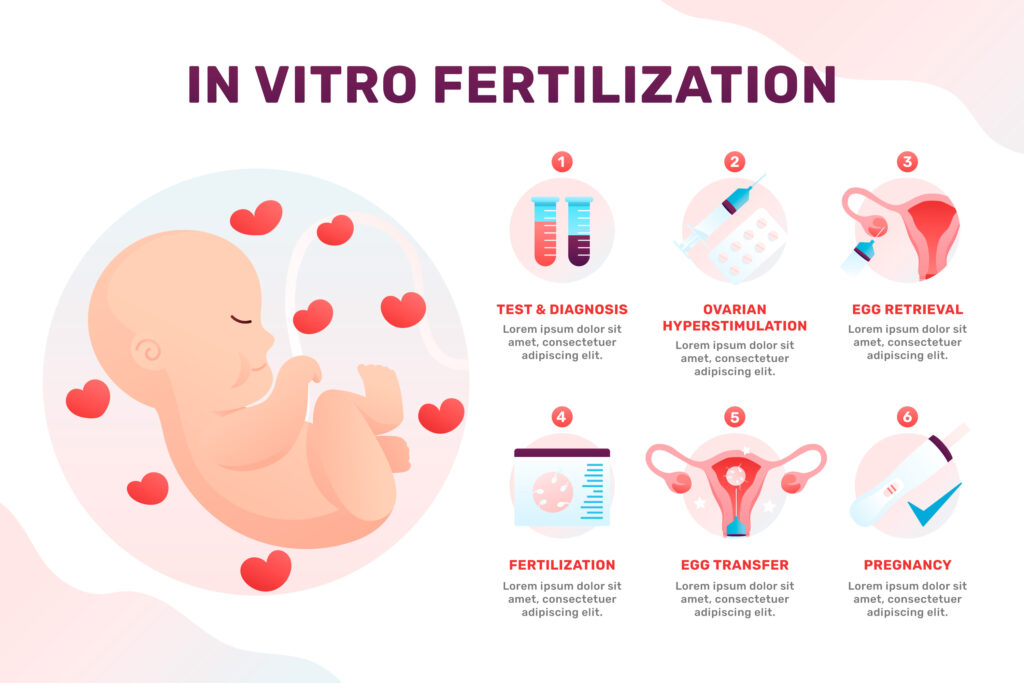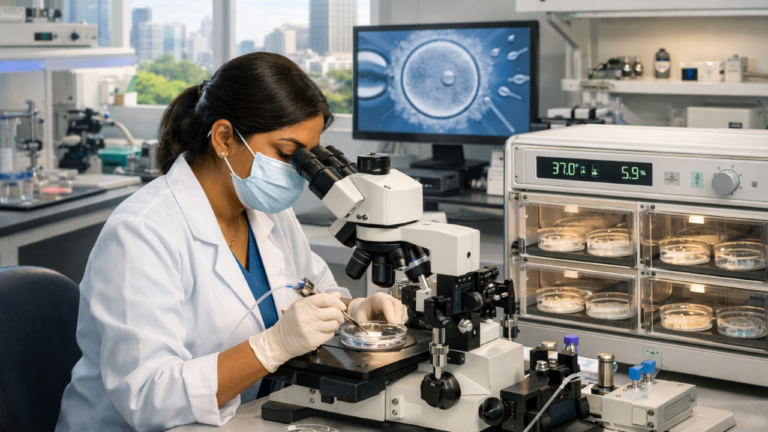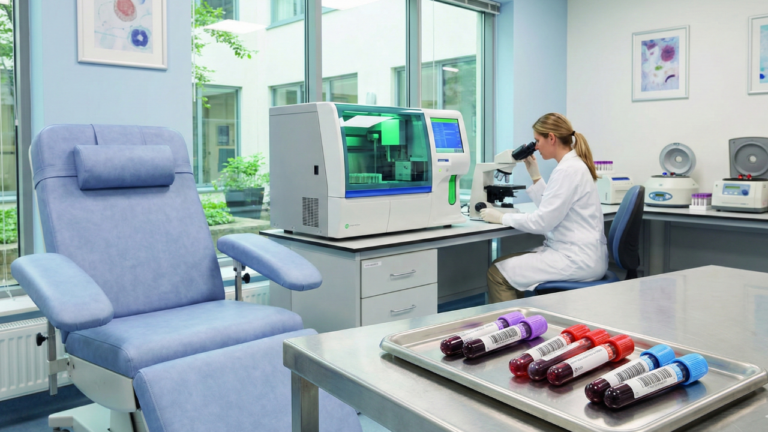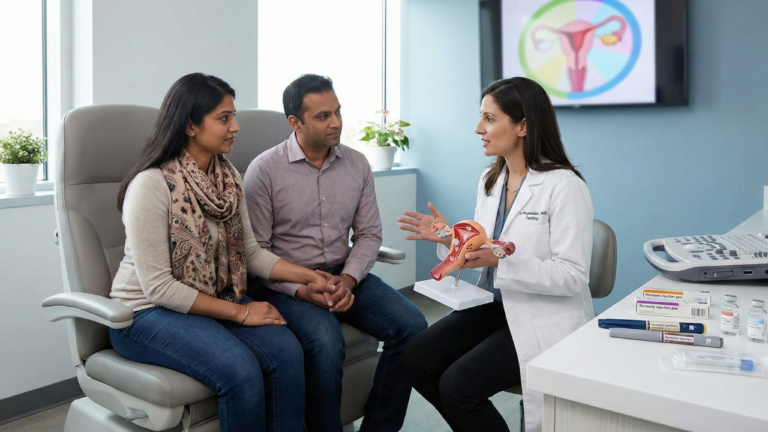Did you know that about 15% of couples struggle with infertility based on a 2024 report? IVF treatment in India could be your answer if you’re learning about fertility options. The country offers budget-friendly treatment that really works. The success rates of IVF in India will surprise you. Women under 35 achieve 72-80% successful IVF-assisted pregnancies. These numbers are way higher than global figures, where IVF live births in women under 35 hover around 44.5%. The costs make even more sense – foreign couples pay between $4,000 to $4,500 for IVF in India. That’s about half what you’d pay in Russia.
These numbers tell an interesting story, but they change based on age and personal factors. To name just one example, see how IVF success rates drop to about 7% for women aged 40 and over. Donor egg IVF gives better odds, with success rates of 50-75% per cycle, whatever the recipient’s age. Indian treatment costs vary between ₹155,000 to ₹210,000 per cycle. This piece will help you begin a journey that could change your life. You’ll learn each step of India’s IVF process, understand the actual costs, and see what these success rates mean for your situation.
Preparing for IVF: What You Need to Know
Getting ready for IVF treatment in India needs you to focus on your body and mind. Your body will respond better to treatment and embryo implantation has better success rates when you prepare well.

Medical and emotional readiness
Your physical preparation makes a big difference in fertility outcomes and treatment success. The right body weight helps control your reproductive hormones. People who are underweight or overweight struggle with ovulation and implantation. Extra weight can trigger hormone problems and insulin resistance that mess with egg maturation and embryo implantation. Light exercise like walking, swimming, and yoga can boost blood flow to reproductive organs. Too much exercise raises miscarriage risks by throwing off hormone balance and stopping normal ovulation. You should follow fitness plans with your doctor’s guidance.
Your emotional health matters just as much. Many patients say IVF feels as stressful as losing a family member or going through divorce. Meditation, deep breathing, and mindfulness help you stay balanced emotionally. The good news is that even though infertility treatment can be stressful, research shows stress doesn’t lower your chances of getting pregnant through IVF.
Understanding fertility issues in men and women
Women’s fertility problems usually come from ovulatory disorders, blocked fallopian tubes, endometriosis, or PCOS. Ovulation disorders top the list as the most common cause of infertility in women. You need to fix any existing gynecological issues before starting IVF treatment because they can really affect your outcomes. Male factors contribute to nearly 40-50% of infertility cases, with problems in sperm count, shape, or movement. Low sperm count, poor motility, or issues like azoospermia (no sperm) might need advanced techniques like ICSI. Lifestyle choices like smoking, drinking alcohol, and exposure to environmental toxins can harm sperm quality.
Choosing the right time to begin treatment
Your age really affects IVF results. Research shows that success rates drop by a lot after age 35. Women under 35 have better success rates, and chances go down quite a bit after 40 because egg quality declines. Think about IVF if you’ve tried to get pregnant for over a year without success (or six months if you’re over 35). You might also need IVF if you have unexplained infertility, ongoing health issues like PCOS or endometriosis, other treatments haven’t worked, or there are male infertility issues. Sometimes waiting isn’t the best choice. You should start IVF right away if you have low ovarian reserve, serious male infertility, or you’re over 38 years old to get the best results.
The IVF Journey: From Consultation to Embryo Transfer
Starting IVF treatment in India involves several carefully coordinated steps that maximize your success chances.
Fertility assessments and diagnosis
Your fertility specialist starts with a full picture of your health through detailed medical history and physical examination. Blood tests check hormone levels and ovarian reserve testing to show egg quantity and quality in women. Men need semen analysis to show sperm count, shape, and movement. The doctor might recommend transvaginal ultrasounds and specialized tests. These tests include hysterosalpingography to get into fallopian tubes or hysteroscopic examination of the uterine cavity.
Hormonal stimulation and monitoring
The next phase begins with ovarian stimulation using hormone medications—typically injectable FSH and LH. These medications help multiple eggs mature at the same time. Your doctor tracks your progress during this 8-14 day process through ultrasounds and blood tests. The developing follicles need careful monitoring. Medication dosages change to prevent issues like ovarian hyperstimulation syndrome. The trigger shot happens exactly 36 hours before egg retrieval once follicles grow to 18-20mm.

Egg retrieval and lab fertilization
Egg retrieval takes 20-30 minutes under sedation. The doctor uses ultrasound guidance to insert a thin needle through the vagina into the ovaries. This helps collect eggs from follicles. The lab prepares sperm through washing techniques to find the healthiest specimens. Eggs and sperm meet either through conventional insemination in a laboratory dish or through ICSI. ICSI involves injecting a single sperm directly into each mature egg.
Embryo transfer and recovery
The embryo transfer happens 2-6 days after collecting eggs. A thin, flexible catheter passes through your cervix into your uterus during this quick, painless procedure. Ultrasound guidance helps position one or more embryos perfectly to improve implantation chances. You might feel mild cramping, bloating, or spotting afterward. Most normal activities can resume right away, but you should avoid intense exercise.
Costs and Financial Planning for IVF in India
Money matters a lot when you want to start your IVF journey. The simple cost of ivf treatment in india ranges between ₹70,000 and ₹3,00,000 per cycle. These prices change based on where you live and what you need.
Price of IVF treatment in India: what’s included
A typical IVF package covers your first consultation, fertility tests, hormone medications, egg retrieval, lab fertilization, and embryo transfer. Big cities like Mumbai and Bangalore charge more (₹1,50,000-₹2,75,000) than smaller cities (₹70,000-₹1,00,000). Your age, health status, and case complexity will affect the final cost.
Hidden costs and optional add-ons
The basic package is just the start. You might need extra procedures like ICSI (₹10,000-₹1,00,000), blastocyst culture (₹10,000-₹20,000), or genetic testing (₹20,000-₹80,000). Freezing your embryos costs ₹20,000-₹40,000 plus yearly storage fees of ₹25,000-₹45,000[163]. Many clinics also suggest “add-ons” that claim better success rates, though science doesn’t always back these claims.
How to plan financially for multiple cycles
Success rarely comes with just one try, so smart financial planning is vital. You should save enough for 2-3 attempts, as that’s what most people need for a successful pregnancy. Some clinics offer package deals for multiple cycles at better rates. You can also look into medical loans and check your insurance for possible coverage. Starting a separate savings fund just for IVF helps you handle surprise costs better.
Measuring Success: Rates, Results, and Realities
Success metrics for ivf treatment in india show key facts that future parents need to know before they begin their IVF experience.
What is the success rate of IVF in India?
IVF success rates in India range between 35-40%, which matches global standards. The first attempt can reach 60-70% success in the best cases. These numbers keep getting better as medical technology and IVF techniques move forward. Success depends on many factors beyond clinical expertise.
IVF success rates by age and health condition
Age stands as the strongest predictor of IVF outcomes. Women under 35 see about 40-45% success per cycle. The success rate drops to 30-35% for ages 35-37, and 20-25% for ages 38-40. Past 40, the rates fall to 10-15% and keep declining each year. Many women over 40 opt for donor eggs, which boost success rates to 50-75% whatever the recipient’s age.
How many cycles are usually needed?
Couples often need multiple attempts to achieve pregnancy. About 50% of patients conceive by their third cycle. The success rates climb with each extra cycle – reaching 65% after six cycles. Most fertility specialists suggest planning for 3-4 IVF cycles at most.
Improving your chances: tips and medical options
A healthy lifestyle makes a big difference in IVF outcomes. People who eat Mediterranean-style diets see 65-68% higher success rates. Advanced techniques like preimplantation genetic testing help ensure embryo quality. Special treatments such as endometrial scratching might boost implantation rates, especially when you have previous implantation failure.
Conclusion
IVF treatment in India is a great way to get hope for countless couples with fertility challenges. This piece explains every aspect of the process, from preparation to outcomes. Age remains the most critical factor that affects your chances of success. Women under 35 have substantially higher pregnancy rates than those over 40. The right timing of your decision can make a huge difference in your results.
Money matters just as much in your IVF trip. India’s affordable cost structure works well for many international couples, especially compared to Western countries. Notwithstanding that, you should prepare for multiple cycles and account for extra procedures. This will help avoid unexpected financial strain during this emotionally demanding time.
India’s IVF treatment success rates match global standards, though personal circumstances affect individual results. Your first try might not work, but don’t give up. Each additional cycle increases your chances of success. A Mediterranean-style diet can also boost your chances of conception.
Your emotional health needs attention throughout this process. Fertility treatments can feel overwhelming, but stress-reduction techniques help maintain stability during challenging times. Research shows stress won’t reduce your IVF success chances.
Starting IVF treatment shows real commitment of time, money, and emotional energy. Many couples find building their family worth every step. Now you have accurate information about costs, procedures, and realistic success rates. This helps you approach your fertility trip with confidence and realistic expectations. The path might have twists and turns, but thousands of successful pregnancies each year show that IVF treatment in India can help fulfill your dreams of becoming a parent.
Key Takeaways
Understanding the complete IVF journey in India empowers couples to make informed decisions about their fertility treatment, from financial planning to realistic expectations about success rates.
- Age is the strongest predictor of IVF success – Women under 35 have 40-45% success rates per cycle, dropping significantly after 40 to just 10-15%.
- Plan financially for multiple cycles – Most couples need 2-3 attempts, with costs ranging ₹70,000-₹3,00,000 per cycle plus potential add-ons like ICSI and genetic testing.
- India offers competitive success rates at lower costs – Success rates of 35-40% match global standards while costing nearly half compared to Western countries.
- Lifestyle modifications significantly impact outcomes – Mediterranean-style diets can increase success rates by 65-68%, while maintaining healthy weight improves hormone function.
- Prepare emotionally and physically before starting – Stress reduction techniques and moderate exercise improve treatment response, though stress itself doesn’t decrease pregnancy chances.
The key to IVF success lies in realistic expectations, proper preparation, and understanding that persistence often leads to positive outcomes, with cumulative success rates reaching 65% after six cycles.
FAQs
Q1. What is the average cost of IVF treatment in India? The cost of IVF treatment in India typically ranges from ₹70,000 to ₹3,00,000 per cycle. However, prices can vary based on location, with treatments in metropolitan cities like Mumbai and Bangalore generally being more expensive than in smaller cities.
Q2. How successful is IVF treatment in India? The success rate of IVF in India ranges between 35-40%, which is comparable to global standards. For women under 35, success rates can be as high as 40-45% per cycle. However, success rates decrease with age, dropping to about 10-15% for women over 40.
Q3. How many IVF cycles are usually needed for success? Most couples require multiple attempts before achieving pregnancy. Approximately 50% of patients conceive by the third cycle, and cumulative success rates increase with each additional cycle, reaching around 65% after six cycles. Most fertility specialists typically recommend planning for 3-4 IVF cycles maximum.
Q4. What factors affect the success of IVF treatment? The most significant factor affecting IVF success is age, particularly for women. Other factors include overall health, lifestyle choices, and specific fertility issues. Following a Mediterranean-style diet and maintaining a healthy weight can significantly improve success rates. Advanced techniques like preimplantation genetic testing can also enhance outcomes.
Q5. What does a typical IVF package in India include? A standard IVF package in India usually covers initial consultation, fertility assessments, hormonal medications, egg retrieval, laboratory fertilization, and embryo transfer. However, additional procedures like ICSI, blastocyst culture, or genetic testing may incur extra costs. It’s important to clarify what’s included in the package and what might be considered add-ons.
Disclaimer: This article is for informational purposes only and does not constitute medical advice. Always consult with a qualified healthcare provider for personalised guidance regarding fertility treatments




